"Horror
writers led me to discover the darker sides to my own nature, and the nature
of everyone around me."
- Gerard Houarner
Wrath:
Thanks very much for taking the time out of your hectic schedule to
speak with us today. How was your Holiday?
Gerard
Houarner: Quiet and fun. Among other things, Tom Piccirilli gave
me a walking brain, which was a fair exchange for the squishable brain
I gave him, since we both have adolescents in the house and are always
in need of extra brains to hand out when they lose the ones they had.
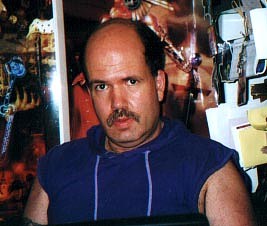
Gerard gets
sexy for the camera |
WJW:
What was it that made you first pick up the pen?
Houarner:
As a kid, I wanted to play with the aliens and monsters I was watching
on Chiller Theater. I started out writing story summaries of those movies
in grade school, and by 11 I was writing and illustrating my own mini-space
operas based on the science fiction I was reading. I also fell in love
with the idea of books: creating a physical object that was full of
adventure and terror and wonder that somehow connected with other people.
The idea of a book or a story surviving the writer also intrigued me.
In high
school, I saw that a writer could create something particular to him
or herself, and that work could also touch others, even people who weren't
alive when a story was written. That people would still be reading Shakespeare,
or Poe, or even Lovecraft, so many years after they were gone fascinated
me. In my adolescent hubris, I didn't think I could be a Shakespeare,
or a Poe, but a Lovecraft - a quirky writer with a cult following -
seemed realistic. Right now, the things that keep me writing are still
those that got me into writing in the first place: playing with aliens
and monsters, making books, and the desire to someday create a story
that reaches into people and stays with them, like a myth.
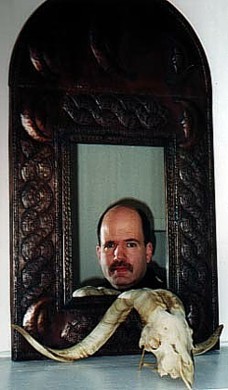
Gerard in
a reflective moment |
WJW:
Who are some of the writer's that you would say most influenced your
style?
Houarner:
Early on, as a kid, Heinlein and Andre Norton really grabbed me, and
I spent a lot of time reading science fiction, including Ellison, Zelazny,
Asimov, Phil Dick, Bradbury, Cordwainer Smith. These guys introduced
me to aliens and monsters and the dangers of the universe. Around
14, on the day of the first Apollo lunar landing, I picked up the Lord
of the Rings books, and that hooked me on fantasy, which taught me about
supernatural threats and adventure. I devoured the old Ballantine Adult
Fantasy line, which introduced me to classic fantasy and horror, including
Lovecraft, Machen, Dunsany, Smith. I quickly picked up on Howard and
Moorcock and Leiber. Throughout this time, I was also reading mythology
books from a variety of cultures, which seemed to me to be the source
material for I lot of the stuff I liked.
As I went
through college, I made a lot of academic hay with Kafka and Conrad,
and took writing workshops run by guys like Joseph Heller (Catch 22) and Joel Oppenheimer (Beat-associated
NYC poet), and sat in on a seminar by William Burroughs (though,
to tell the truth, I did that for the girls - that guy was a magnet,
kinda like Dallas or pre-marital Ellison).
"During the horror boom of the 80's, I discovered that no matter what genre I wrote in, I was essentially a "dark" writer."
From sf and fantasy writers I picked up not only a passionate love for the fantastic, but the importance of building internal logic in a writer's imagined world,
and speculating about science and psychology to create monsters, aliens,
creatures. Horror writers led me to discover the darker sides to my own
nature, and the nature of everyone around me. The literary writers taught
me the importance of language, poetry, and character. My college workshop
teachers also encouraged me to experiment, to reach beyond genre limitations
and into myself, take chances with structure and the "rules"
of genre. Myths and the Greek tragedies taught me about the primal constants
in people.
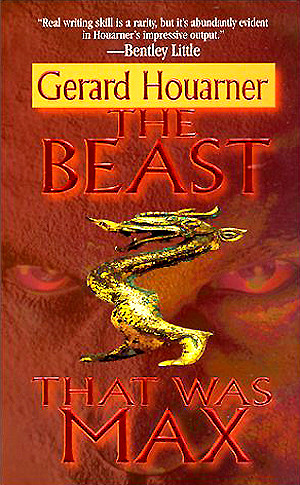
THE BEAST THAT WAS MAX, is but the first. |
During the horror boom of the 80's, I discovered that no matter
what genre I wrote in, I was essentially a "dark" writer. I
realized my world view and my sensibilities tilted towards the morbid,
which was why I wasn't doing so well in the fantasy field. I began focusing
on that aspect of my writing, reading what was coming out in the 80's
and going back to people like Fritz Leiber, Phil Dick, and Harlan Ellison
to see how they mixed genres while still maintaining "literary"
standards. Writers like Jim Thompson, Joe Lansdale, Clive Barker, Ramsey
Campbell, Dan Simmons, Michael Shea, Thomas Ligotti, William Browning
Spencer, Peter Straub, Gene Wolfe, and anthologies like Dark Forces and
later Borderlands, all helped me to focus on the kinds of stories I wanted
to tell. More recently, guys like Tom Piccirilli and Tim Lebbon have proven
inspirational to me.
WJW: Tell me about the concept for THE
BEAST THAT WAS MAX. It almost reads like three seperate novellas.
Houarner:
This is a long and complicated story.
THE
BEAST THAT WAS MAX was originally a short story written in 1995
for the Hot Blood anthologies. It was rejected, but I gave it to Dave
Barnett of Necro Publications when he offered me the opportunity to
put together a short story collection. He liked "Beast" and
asked if there were any more stories like that, and I sketched out a
nine-story arc for the character. The first three stories, including
"The Beast That Was Max" were published in the story collection,
Painfreak, that came out from Necro in 1996. The fourth story of the
Max arc became a novella when Tom Piccirilli invited me into a three-way
collection, along with Ed Lee, that was also put out by Necro Publications.
The fifth story in the Max arc became a novel when Dave asked me for
one.
A writer friend showed Painfreak to his agent. He liked it, asked to see
more stuff, and I sent him my Max novel. He said this was all fine and
dandy, but I needed a real "first" Max novel if I wanted to
sell the Max novel I had already written to a commercial publisher.
So I looked at the three short stories and the novella and realized
there was nothing to indicate how Max had reached the point where he
was ready to change his life in that first story. So I wrote a 40,000
word "prequel" that prepared the psychic ground for Max, put
it together with the three short stories and the other novella, and
had myself a "first" Max novel. Of course, it's a "novel
in stories," but fortunately, I was following a tight character
arc so the main story flows through the shorter plot sequences.
"...choosing stories for
Space and Time does make me far more sensitive about my own work waiting in
various slush piles..."
WJW:
How does your position as fiction editor for Space and Time Magazine effect
your writing career? Do you often have to choose between reading submissions
and working on your own stories?
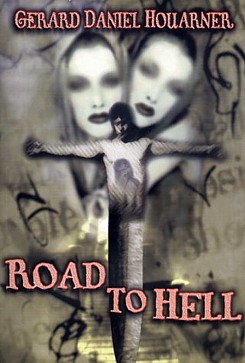 Houarner:
I'm very lucky in that Gordon Linzner, the publisher of Space and Time,
has a staff of associate editors who do most of the slush pile reading.
I review the stories which get past the associate editors, as well as
stories from more established writers which Gordon sends directly to
me. This makes the decision-making process more agonizing, because I
get a much higher percentage of interesting stories, but I don't have
to deal with all three hundred manuscripts Gordon gets a month. So no,
I don't often have to choose between editing and writing. Houarner:
I'm very lucky in that Gordon Linzner, the publisher of Space and Time,
has a staff of associate editors who do most of the slush pile reading.
I review the stories which get past the associate editors, as well as
stories from more established writers which Gordon sends directly to
me. This makes the decision-making process more agonizing, because I
get a much higher percentage of interesting stories, but I don't have
to deal with all three hundred manuscripts Gordon gets a month. So no,
I don't often have to choose between editing and writing.
However,
choosing stories for Space and Time does make me far more sensitive
about my own work waiting in various slush piles, and I'm much more
aware of trying to stand out, hook a reader's interest, maintain pacing,
etc, through my experience at Space and Time. Working the other side
of the editorial desk has brought home the lessons all those workshop
teachers were trying to teach me over the years!
WJW:
I understand that there's a second Max novel coming out from Leisure
Books next year. What can we expect to see in the sequel?
Houarner:
Remember that 9-story Max arc I mentioned? The second Max novel, which
was actually the first written, and published as a limited edition by
Necro Publications some years ago, is story number five in that arc.
How's that for confusion! What you're going to see is the continued
development of the consequences of Max's decision to become "human."
He's going to learn more about love, particularly in relation to family,
and he'll also receive some lessons about hatred and vengeance from
the spirits of his old victims. His relationship with his employers
will also be changing. Of course, there'll be the usual mix of wild
sex and violence, mad demons and gods, killers and an innocent or two
thrown in for good measure. The book is called Road To Hell; look for
it in the Fall of 2002, from Leisure.WJW:
What else do you have planned for 2002?
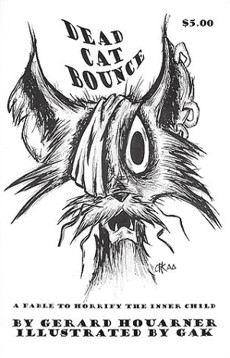
Houarner and GAK are working on another DEAD CAT collaboraration |
Houarner:
Delirium is publishing another short story collection, Devoured By Her
Enigmatic Smile, sometime around the middle of the year. About half
of this will be original stories - I'm working on material as we speak.
Dave Barnett,
under his Bedlam imprint, is putting out an anthology cooked up by GAK at the last World Horror convention based on the Dead Cat story we did
for Space and Time, and which was nominated for a Stoker. I'm co-editing
the anthology, which will feature an astounding line-up of writers,
and I've written a couple of new Dead Cat pieces for the book. GAK is
illustrating the entire thing.
Leisure is publishing the next Max book, The Road to Hell, in the Fall. I'm
working on the third Max book.
In
terms of short stories, 2002 starts off with a bang at Horrorfind.com
with The Fearnaut, in January. Other stories scheduled include: a cyber
sf story, Memphis Blue Again, coming out in Fantastic Stories of the
Imagination in the Spring; as well as some anthology appearances - "The
Keeper" in The Asylum vol 2; "The Wound of Her Making,"
Dark Testament; "Children in the Moonless Night," in the Extremes
Africa CD (I see you're also going to be in this one); "Devoured By Her Enigmatic Smile," in one of
the Tooth and Claw volumes; "The Unborn," in the charity antho
Dreaming of Angels; and a fantasy, "Ballard's Books," in the
Dreamhaven bookstore anthology.
WJW:
Thanks for taking the time to talk with us. Best of luck in the new
year.

END |
Interview
Copyright 2002 E.C.McMullen Jr.
Visit Gerard Houarner at his Amazon Author Page. |




 Feo Amante's Horror Home Page, Feo Amante's Horror Thriller, and feoamante.com are owned and
Feo Amante's Horror Home Page, Feo Amante's Horror Thriller, and feoamante.com are owned and